October 16, 2019 | Deborah Kotz
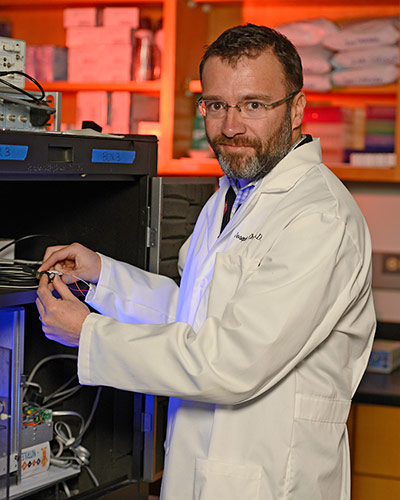
University of Maryland School of Medicine Researchers Elucidate Pathway that Causes Psychological Effects Like Increased Impulsivity and Found Neurosteroid Drug Can Reverse Those Effects
As a growing number of U.S. states legalize the medicinal and recreational use of marijuana, an increasing number of American women are using cannabis before becoming pregnant and during early pregnancy often to treat morning sickness, anxiety, and lower back pain. Although emerging evidence indicates that this may have long-term consequences for their babies’ brain development, how this occurs remains unclear.
A University of Maryland School of Medicine study using a preclinical animal model suggests that prenatal exposure to THC, the psychoactive component of cannabis, makes the brain’s dopamine neurons (an integral component of the reward system) hyperactive and increases sensitivity to the behavioral effects of THC during pre-adolescence. This may contribute to the increased risk of psychiatric disorders like schizophrenia and other forms of psychosis later in adolescence that previous research has linked to prenatal cannabis use, according to the study published Monday in the journal Nature Neuroscience.
The team of researchers, from UMSOM, the University of Cagliari (Italy) and the Hungarian Academy of Sciences (Hungary), found that exposure to THC in the womb increased susceptibility to THC in offspring on several behavioral tasks that mirrors the effects observed in many psychiatric diseases. These behavioral effects were caused, at least in part, by hyperactivity of dopamine neurons in a brain region called the ventral tegmental area (VTA), which regulates motivated behaviors.
More importantly, the researchers were able to correct these behavioral problems and brain abnormalities by treating experimental animals with pregnenolone, an FDA-approved drug currently under investigation in clinical trials for cannabis use disorder, schizophrenia, autism, and bipolar disorder.
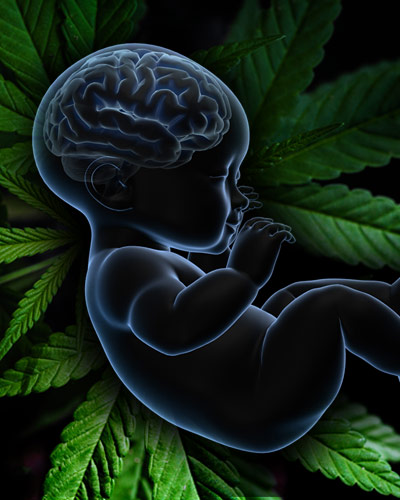 “This is an exciting finding that suggests a therapeutic approach for children born to mothers who used cannabis during pregnancy,” said Joseph Cheer, PhD, a Professor of Anatomy & Neurobiology and Psychiatry at the University of Maryland School of Medicine. “It also raises important questions that need to be addressed such as how does pregnenolone exert its effects and how can we improve its efficacy? Do these detrimental effects persist into adulthood, and if so, could they also be treated in a similar way?”
“This is an exciting finding that suggests a therapeutic approach for children born to mothers who used cannabis during pregnancy,” said Joseph Cheer, PhD, a Professor of Anatomy & Neurobiology and Psychiatry at the University of Maryland School of Medicine. “It also raises important questions that need to be addressed such as how does pregnenolone exert its effects and how can we improve its efficacy? Do these detrimental effects persist into adulthood, and if so, could they also be treated in a similar way?”
The researchers concluded that as physicians caution pregnant women against alcohol and cocaine intake because of their detrimental effects to the fetus, they should also, based on these new findings, advise them on the potential negative consequences of using cannabis specifically during pregnancy.
“The risks associated with maternal use of cannabis should not be underestimated, and this new research highlights the importance of studying the pathways that lead to neurodevelopmental adverse events,” said E. Albert Reece, MD, PhD, MBA, Executive Vice President for Medical Affairs, UM Baltimore, and the John Z. and Akiko K. Bowers Distinguished Professor and Dean, University of Maryland School of Medicine. "It is also important, however, to keep in mind that this is preclinical research and that the findings should be replicated in humans to the fullest extent possible."
The study was funded by an international collaborative program on marijuana research issued by the U.S. National Institute on Drug Abuse, the National Research, Development and Innovation Office of Hungary and the University of Cagliari as well as private European foundations.
About the University of Maryland School of Medicine
Now in its third century, the University of Maryland School of Medicine was chartered in 1807 as the first public medical school in the United States. It continues today as one of the fastest growing, top-tier biomedical research enterprises in the world -- with 43 academic departments, centers, institutes, and programs; and a faculty of more than 3,000 physicians, scientists, and allied health professionals, including members of the National Academy of Medicine and the National Academy of Sciences, and a distinguished recipient of the Albert E. Lasker Award in Medical Research. With an operating budget of more than $1 billion, the School of Medicine works closely in partnership with the University of Maryland Medical Center and Medical System to provide research-intensive, academic and clinically based care for more than 1.2 million patients each year. The School has over 2,500 students, residents, and fellows, and more than $540 million in extramural funding, with most of its academic departments highly ranked among all medical schools in the nation in research funding. As one of the seven professional schools that make up the University of Maryland, Baltimore campus, the School of Medicine has a total workforce of nearly 7,000 individuals. The combined School and Medical System (“University of Maryland Medicine”) has an annual budget of nearly $6 billion and an economic impact more than $15 billion on the state and local community. The School of Medicine faculty, which ranks as the 8th highest among public medical schools in research productivity, is an innovator in translational medicine, with 600 active patents and 24 start-up companies. The School works locally, nationally, and globally, with research and treatment facilities in 36 countries around the world. Visit medschool.umaryland.edu
Contact
Department of Anesthesiology
(410) 328-6120 (phone)
(410) 328-5531 (fax)
swalsh@som.umaryland.edu
Deborah Kotz
Director of Media Relations
Office of Public Affairs & Communications
University of Maryland School of Medicine
o: 410-706-4255
c: 410-804-0054
t: @debkotz2
Related stories

Tuesday, May 10, 2022
Longtime Academic and Clinical Affairs Leader, Department Chair, and Faculty Member, Tony Lehman, MD, Announces Retirement
University of Maryland School of Medicine (UMSOM) Dean E. Albert Reece, MD, PhD, MBA, announced today that Anthony Lehman, MD, MSPH, who served the UMSOM for more than 30 years as Senior Associate Dean for Clinical Affairs, Department Chair, and distinguished faculty member in the UMSOM Department of Psychiatry, will retire, effective June 30, 2022.

Tuesday, February 09, 2021
UM School of Medicine Researchers Find that Misuse of Opioid Drugs During Pregnancy Could Have Lasting Impact on Child’s Development from Infancy Through Teen Years
As the number of pregnant women using opioid drugs continues to rise, questions have been raised about the long-term health effects on children exposed to these drugs in the womb. Researchers at the University of Maryland School of Medicine now have preliminary but striking evidence that suggests that such exposure can cause long-lasting impairment in the brain’s ability to process sensory information. These impairments may give rise to autism, attention deficit hyperactivity disorder, and substance use disorders during adolescence. The landmark study, recently published in Journal of Neuroscience, used a preclinical model to study the issue and found that newborn mice exposed to the opioid fentanyl in the womb developed withdrawal symptoms and sensory processing disorders that lasted at least until adolescence.

Thursday, April 16, 2020
University of Maryland School of Medicine Launches Center for Substance Use in Pregnancy
Asaf Keller, PhD, Professor and Interim Chair of the Department of Anatomy & Neurobiology at the University of Maryland School of Medicine (UMSOM), along with UMSOM Dean E. Albert Reece, MD, PhD, MBA, have announced the formation of a new research center to study the long-term health effects on the brains of children born to women who use drugs and alcohol during pregnancy. The Center for Substance Use in Pregnancy will conduct pre-clinical and clinical neuroscience research, focusing on the use of marijuana, opioids, nicotine and alcohol, all of which have increased dramatically in recent years.

Thursday, February 27, 2020
UMSOM Department of Psychiatry Creates New Position to Strengthen and Support Research Program
Jill RachBeisel, MD, Interim Chair of the Department of Psychiatry at the University of Maryland School of Medicine (UMSOM), along with UMSOM Dean E. Albert Reece, MD, PhD, MBA, announced today that Gloria Reeves, MD, Associate Professor of Psychiatry, has been appointed to serve as the Vice Chair for Research of the Department.

Thursday, January 16, 2020
University of Maryland School of Medicine Research Shows That Older Patients With Untreated Sleep Apnea Need Greater Medical Care
Obstructive sleep apnea (OSA) is a common and costly medical condition leading to a wide range of health risks such as cardiovascular disease, stroke, depression, diabetes and even premature death. Researchers at the University of Maryland School of Medicine (UMSOM) found that the medical costs are substantially higher among older adults who go untreated for the disorder.
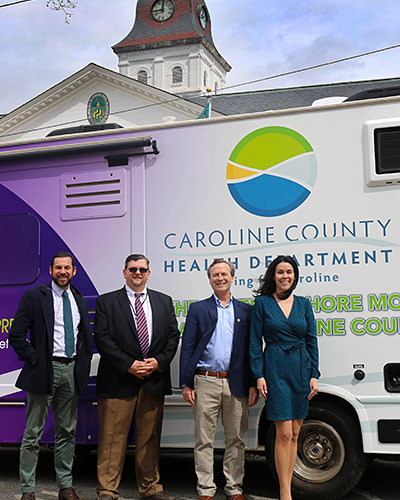
Thursday, April 04, 2019
Mobile Addiction Treatment Unit Serves Maryland Eastern Shore
Health and addiction treatment officials from the Caroline County Health Department, Maryland Department of Health, the Maryland Opioid Operational Command Center, and the University of Maryland School of Medicine (UMSOM) in Denton, MD., launched the Eastern Shore Mobile Care Collaborative (ESMCC), a mobile system designed to provide state-of-the-art treatment for opioid disorders for those in need on the Maryland Eastern shore.
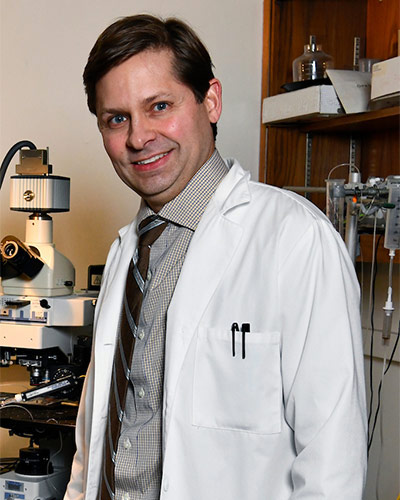
Wednesday, March 27, 2019
UMSOM Researchers Discover a Critical Receptor Involved in the Response to Fast-Acting Antidepressants Like Ketamine
Effective treatment of clinical depression remains a major mental health issue, with roughly 30 percent of patients who do not respond to any of the available treatments. Researchers at the University of Maryland School of Medicine (UMSOM) have discovered a crucial receptor called mGlu2 that is critical to the mechanism of fast-acting antidepressants such as ketamine when used to treat depression.
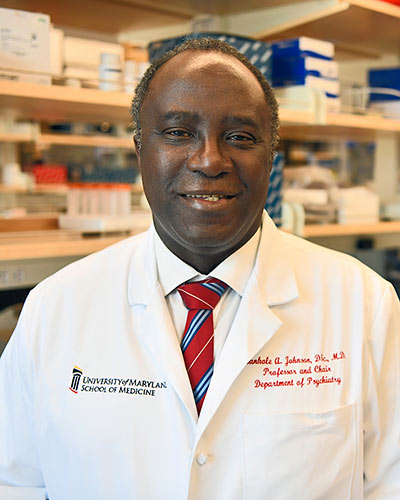
Tuesday, October 16, 2018
Bankole A. Johnson Receives Prestigious American Society of Addiction Medicine Award
Bankole Johnson, DSc, MD, the Dr. Irving J. Taylor Professor and Chair of the Department of Psychiatry at the University of Maryland School of Medicine (UMSOM), has been named to receive the American Society of Addiction Medicine’s (ASAM) R. Brinkley Smithers Distinguished Scientist Award.

Friday, April 20, 2018
New Research Illuminates Important Links Between Avoidance Behavior and Key Brain Chemicals
Scientists at the University of Maryland School of Medicine have for the first time found direct causal links between a key brain chemical and avoidance-behavior related to pain and fear.
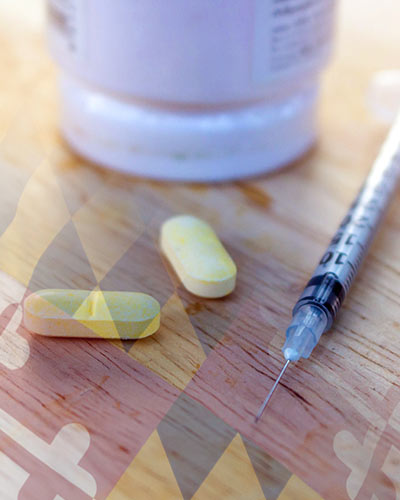
Friday, January 05, 2018
Fighting Opioid Addiction from Baltimore to Garrett County: University of Maryland School of Medicine Rises to the Challenge
The opioid epidemic has been deadly for Maryland. In 2016, more than 2000 people in the state died from overdoses; in 2017, deaths rose another 40 percent, and deaths from the powerful synthetic opioid fentanyl were up nearly 140 percent. Last year, Gov. Larry Hogan declared a state of emergency in response to the opioid epidemic, saying the state needs an “all-hands-on-deck approach.”
Wednesday, June 07, 2017
Dr. Jill RachBeisel Named Vice Chair for Clinical Affairs in UM School of Medicine’s Department of Psychiatry
Bankole A. Johnson, DSc, MD, MBChB, The Dr. Irving J. Taylor Professor and Chair for the Department of Psychiatry, Professor of Pharmacology, Anatomy and Neurobiology, along with UM SOM Dean E. Albert Reece, MD, PhD, MBA, announced today that Jill RachBeisel, MD, Associate Professor of Psychiatry, has been named Vice Chair for Clinical Affairs for the UM SOM Department of Psychiatry, commencing at the start of the next academic year.
